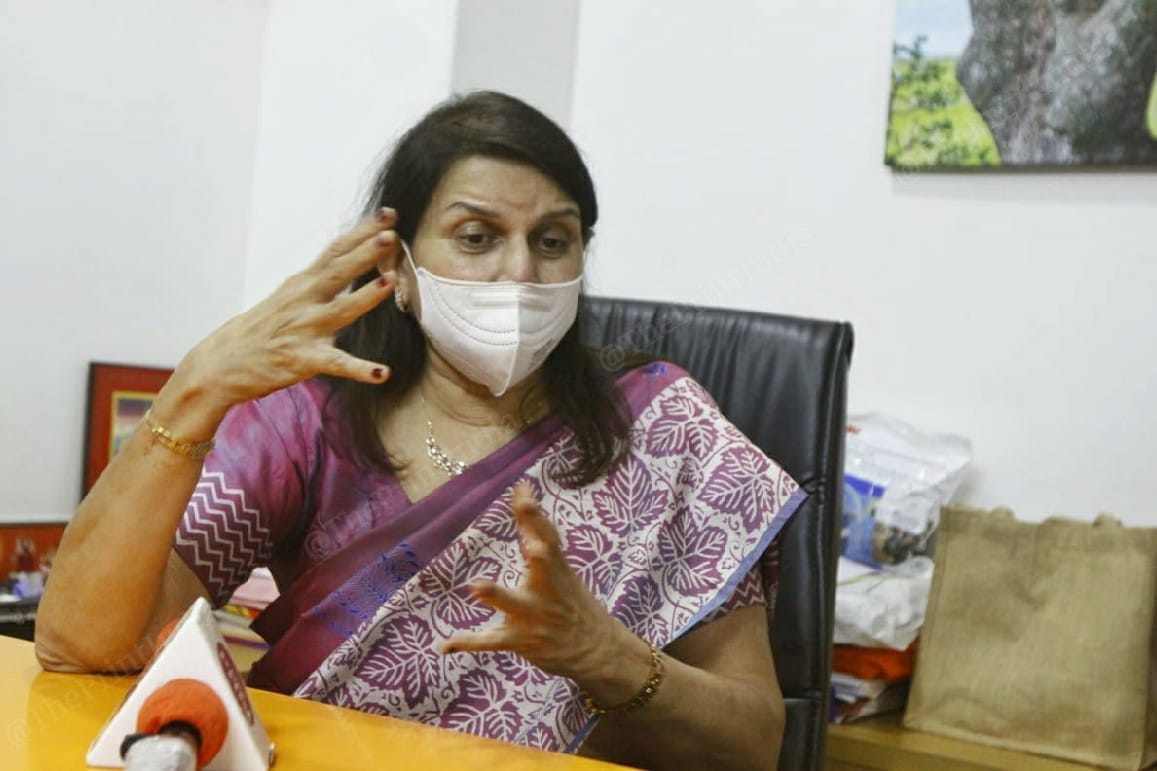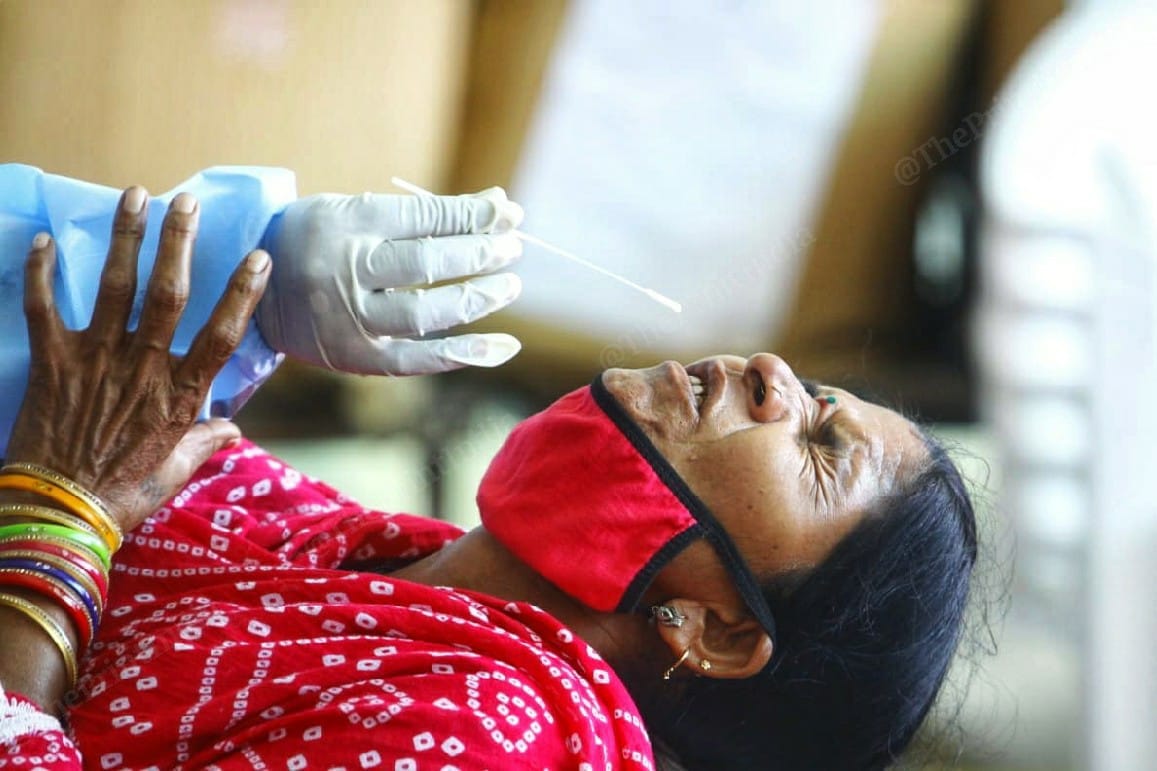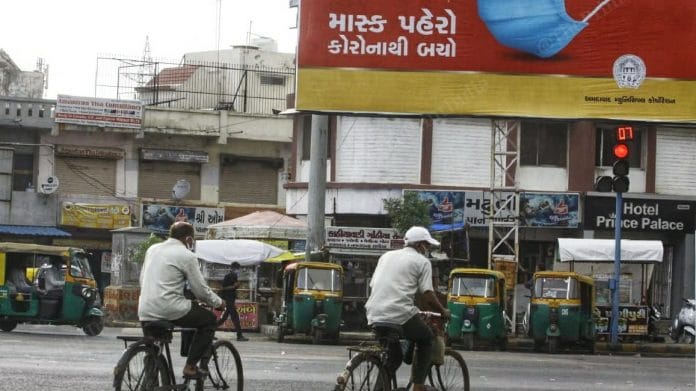Ahmedabad: The Gujarat government has doubled the number of Covid-19 tests it is conducting ever since a central team from New Delhi arrived in the state last week.
The team comprised of AIIMS director Randeep Guleria, ICMR director general Dr Balram Bhargav, NITI Aayog member Dr Vinod Paul and additional secretary (Health), Arti Ahuja, is in the state to monitor the Covid response as Gujarat has the worst mortality rate in the country and has experienced an alarming rise in the number of cases.
Gujarat’s mortality rate of 4.5 per cent easily eclipses the national average of 2.5 per cent while the state had, as of Sunday, recorded a total of 47,390 cases, of which 11,233 were still active. In all, there have been 2,132 deaths in the state.
In response to the central team’s visit, the state has ramped up testing.
From an average daily testing rate of 4,700 in May and 5,300 in June, Gujarat conducted 11,463 tests on 16 July, the day the team arrived.
On the following days of 17 July, 18 July and 19 July, the state recorded 12,830, 12,297 and 11,825 tests respectively.
The numbers had been increasing even in the run-up to the team’s visit. On 13 July, for instance, the state collected only 5,619 samples for testing. On 14 July and 15 July, the number was 8,102 and 9,340 respectively.
“On an average, around 6,000 tests are conducted in Gujarat,” Dr Mona Desai, president, Ahmedabad Medical Association, told ThePrint. “But since the last two days (17 and 18 July), there has been an increase to around 11,000 to 12,000. However, I feel even that is also quite less.”
“The state requires four times more number of tests,” she added.

Central team reviews treatment protocol
The central team has discussed Covid-19 treatment protocol with health officials and doctors in view of the high mortality rate. It also met physicians and members of the Indian Medical Association (IMA).
Dr Guleria suggested that the key treatment for Covid-19 patients is oxygen therapy. “The main treatment is oxygen therapy, steroids in mild to moderate patients, anticoagulants and prone positioning,” he told ThePrint. “These will save more lives than tocilizumab or remdesivir.”
The central government, he said, is expected to come up with a national policy on the use of tocilizumab in order to check its misuse.
According to Dr Guleria, tocilizumab must only be given to patients in the severe stage. “If we reduce the body’s normal inflammation, then one may contract other infections,” he said. “Tocilizumab is a double-edged sword.”
Also read: Why Congress making Hardik Patel Gujarat working president goes beyond his Patidar identity
Gujarat’s faltering Covid fight
Gujarat’s efforts to combat the Covid-19 have been under the lens for a while now. Right from April, the state has been beset by soaring infection, high death rates and slow recoveries.
In May, the Gujarat High Court came down heavily on authorities, particularly in Ahmedabad, which in June recorded a fatality rate of 7.1 per cent. The court even likened the Ahmedabad Civil Hospital to a “dungeon”.
But doctors in Ahmedabad told ThePrint that one of the biggest reasons behind the state’s high mortality rate was late identification of the infection, which increased the chances of mortality.
“The problem here is that people come at a very late stage to a doctor. They are so afraid to go to a Covid-19 hospital,” said Dr Desai, the president of the Ahmedabad Medical Association.
“Even if they have symptoms, they just stay at home and when they go to a hospital, it is at a very late stage,” she added.
Dr Chandresh Jardosh, president, Indian Medical Association, Gujarat, said that patients aren’t taking the infection seriously.
“If a Covid-19 patient is home quarantined, after three to four days, he feels good and takes the liberty to go out and ends up spreading the infection,” Dr Jardosh said.
He also explained that late identification of Covid-19 could also be attributed to low testing.

Doctors seek more testing
While Gujarat has now ramped up testing, its low figures had prompted doctors to urge the government to better the numbers.
The Ahmedabad Medical Association, headed by Dr Desai, had filed a plea in the Gujarat High Court on 7 July seeking that the tests in the state be made proportionate to the population. This association represents over 9,000 doctors in the state.
Dr Desai believes that an average of 6,000 tests in a state with a population 6.27 crore is simply not adequate. “In other states, over 25,000 to 30,000 tests are being conducted,” she told ThePrint. “This is the case even in Delhi, whose population is less than Gujarat. Similarly Tamil Nadu, which has almost the same population as Gujarat, is conducting 30,000 tests.”
The Gujarat High Court is expected to hear the plea in the coming week.
When asked about the low numbers of testing, Dr Kadri, executive director, State Health System Resource Centre, told ThePrint, “We can’t keep comparing our testing capacities to developed countries. It is not only a matter of tests being conducted, but positivity rate also matters.”
“It doesn’t have to be blanket testing but it has to be smart and strategic testing. Testing must be done in areas that require it the most,” he added.
Also read: Gujarat HC judge gets anonymous calls and messages before a hearing, orders probe






